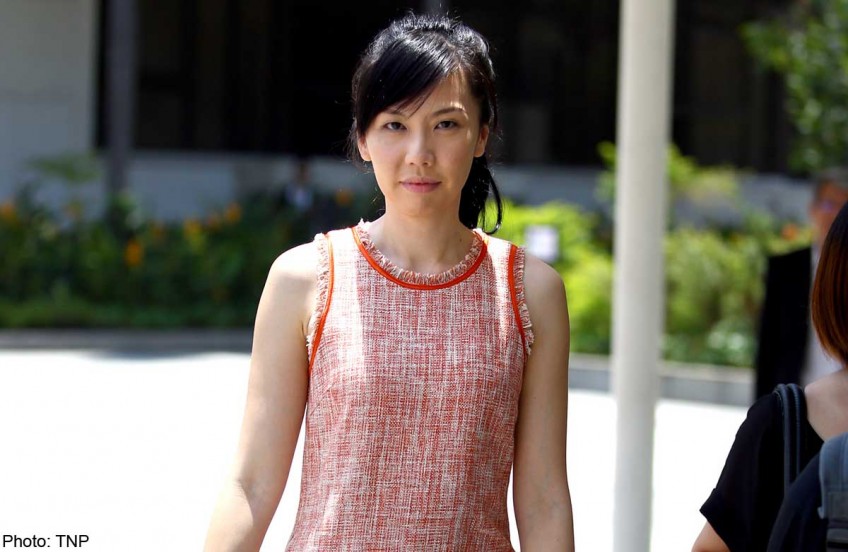CHC trial: Finance manager told to exclude 'sensitive issues' from minutes

Finance manager says she was told to exclude 'sensitive issues' from minutes.
But during cross-examination by the prosecution, City Harvest Church (CHC) finance manager Sharon Tan struggled to explain why she included or omitted topics that were discussed during CHC board meetings.
Tan, 39, said she was merely following instructions from her predecessor and co-accused, Serina Wee, to exclude "sensitive issues" that could jeopardise the church's dealings.
Yesterday, Chief Prosecutor Mavis Chionh cross-examined Tan, who is facing three counts of criminal breach of trust and four of falsifying accounts, and began by asking what Tan would record in the CHC board meeting minutes.
Tan's answers varied as Ms Chionh grilled her for about two hours on this topic.
Ms Chionh first pointed out that Tan had said earlier during the hearing that details concerning Xtron were "sensitive" and so she would "try not to minute down as much as we can".
Tan yesterday clarified that she had understood this from Wee, based on directions given by the board.
She later said she was also afraid her junior staff would see the contents of the minutes and leak the details to the public.
She said that certain discussions were not minuted down if documenting them would affect the church's potential in its building search.
But Ms Chionh pointed out in a set of minutes that discussions relating to Xtron's role in negotiating for a building had been recorded.
Tan then said that the minutes had left out the negotiation process.
'HARD TO FIX POSITION'
"It's very hard for me to fix a position on... what I recorded and what I've not recorded," she said.
Said Ms Chionh: "I suggest to you that the reason... is because you know very well that you haven't been truthful in your evidence.
That is why you shift position when asked about these board minutes of meeting according to what answer you think at that moment is favourable to you."
Tan disagreed.
Ms Chionh also accused Tan and her co-accused of planning to hide information from the auditors. For example, in a set of documents showing excerpts of a BlackBerry message exchange, Tan had told former CHC fund manager Chew Eng Han that "there may be a problem" as CHC auditor Sim Guan Seng was "doing Xtron accounts so (he) will know where the money goes to".
Tan claimed that she was just concerned that it would reveal the Crossover Project, which was the plan to evangelise non-Christians through pop music, and how it was linked to the church.
But Ms Chionh said: "What you were really concerned about here was Mr Sim finding out that advance rental from CHC had been channelled into the redemption of the Firna bonds."
Tan disagreed.
Yesterday's hearing was also characterised by Tan taking long pauses, sometimes up to a minute, before replying.
At one point, Tan briefly scowled at Ms Chionh when the chief prosecutor accused her of being untruthful.
"I've been truthful in my evidence-in-chief, I've been truthful during the (cross-examination), on how I minute down the discussion or the decisions that are made by the board," she said firmly.
The trial continues today.
rloh@sph.com.sg
About the case
City Harvest Church founder Kong Hee and five others are on trial for allegedly misusing church funds through sham bonds.
This includes $24 million to allegedly fund the music career of Kong’s wife, Ms Ho Yeow Sun, whose stage name is Sun Ho, and another $26.6 million to allegedly cover up the first amount.
They are said to have done this through music production firm Xtron and glass manufacturer Firna, run by long-time supporters of the church.
Kong, former board member John Lam, finance manager Sharon Tan, former fund manager Chew Eng Han, deputy senior pastor Tan Ye Peng and former finance manager Serina Wee face charges of criminal breach of trust and/or falsifying accounts.
Prosecutors had sought to show how Xtron and Firna directors simply did the accused’s bidding.
The defence has argued that the transactions were legitimate, with the accused acting “in good faith” on the advice of lawyers and auditors.

This article was first published on Sep 23 DAY, 2014.
Get The New Paper for more stories.